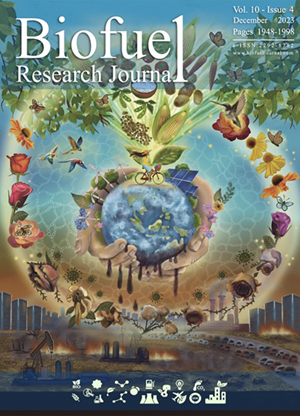A review on the application of nanomaterials in improving microbial fuel cells
IF 11.9
Q1 ENERGY & FUELS
引用次数: 33
Abstract
Materials at the nanoscale show exciting and different properties. In this review, the applications of nanomaterials for modifying the main components of microbial fuel cell (MFC) systems (i.e., electrodes and membranes) and their effect on cell performance are reviewed and critically discussed. Carbon and metal-based nanoparticles and conductive polymers could contribute to the growth of thick anodic and cathodic microbial biofilms, leading to enhanced electron transfer between the electrodes and the biofilm. Extending active surface area, increasing conductivity, and biocompatibility are among the significant attributes of promising nanomaterials used in MFC modifications. The application of nanomaterials in fabricating cathode catalysts (catalyzing oxygen reduction reaction) is also reviewed herein. Among the various nanocatalysts used on the cathode side, metal-based nanocatalysts such as metal oxides and metal-organic frameworks (MOFs) are regarded as inexpensive and high-performance alternatives to the conventionally used high-cost Pt. In addition, polymeric membranes modified with hydrophilic and antibacterial nanoparticles could lead to higher proton conductivity and mitigated biofouling compared to the conventionally used and expensive Nafion. These improvements could lead to more promising cell performance in power generation, wastewater treatment, and nanobiosensing. Future research efforts should also take into account decreasing the production cost of the nanomaterials and the environmental safety aspects of these compounds.纳米材料在微生物燃料电池改进中的应用综述
纳米级材料表现出令人兴奋的不同性质。本文综述了纳米材料在修饰微生物燃料电池(MFC)系统主要部件(即电极和膜)方面的应用及其对电池性能的影响。基于碳和金属的纳米颗粒以及导电聚合物可以促进厚的阳极和阴极微生物生物膜的生长,从而增强电极和生物膜之间的电子转移。扩展活性表面积、增加导电性和生物相容性是用于MFC改性的有前途的纳米材料的重要特性。综述了纳米材料在制备阴极催化剂(催化氧还原反应)中的应用。在阴极侧使用的各种纳米催化剂中,金属氧化物和金属有机框架(MOFs)等金属基纳米催化剂被认为是传统使用的高成本Pt的廉价和高性能的替代品。此外,与传统使用且昂贵的Nafion相比,用亲水和抗菌纳米颗粒修饰的聚合物膜可以导致更高的质子传导性并减轻生物污垢。这些改进可能会在发电、废水处理和纳米生物传感方面带来更有前景的电池性能。未来的研究工作还应考虑到降低纳米材料的生产成本和这些化合物的环境安全方面。
本文章由计算机程序翻译,如有差异,请以英文原文为准。
求助全文
约1分钟内获得全文
求助全文
来源期刊

Biofuel Research Journal-BRJ
ENERGY & FUELS-
CiteScore
22.10
自引率
1.50%
发文量
15
审稿时长
8 weeks
期刊介绍:
Biofuel Research Journal (BRJ) is a leading, peer-reviewed academic journal that focuses on high-quality research in the field of biofuels, bioproducts, and biomass-derived materials and technologies. The journal's primary goal is to contribute to the advancement of knowledge and understanding in the areas of sustainable energy solutions, environmental protection, and the circular economy. BRJ accepts various types of articles, including original research papers, review papers, case studies, short communications, and hypotheses. The specific areas covered by the journal include Biofuels and Bioproducts, Biomass Valorization, Biomass-Derived Materials for Energy and Storage Systems, Techno-Economic and Environmental Assessments, Climate Change and Sustainability, and Biofuels and Bioproducts in Circular Economy, among others. BRJ actively encourages interdisciplinary collaborations among researchers, engineers, scientists, policymakers, and industry experts to facilitate the adoption of sustainable energy solutions and promote a greener future. The journal maintains rigorous standards of peer review and editorial integrity to ensure that only impactful and high-quality research is published. Currently, BRJ is indexed by several prominent databases such as Web of Science, CAS Databases, Directory of Open Access Journals, Scimago Journal Rank, Scopus, Google Scholar, Elektronische Zeitschriftenbibliothek EZB, et al.
 求助内容:
求助内容: 应助结果提醒方式:
应助结果提醒方式:


